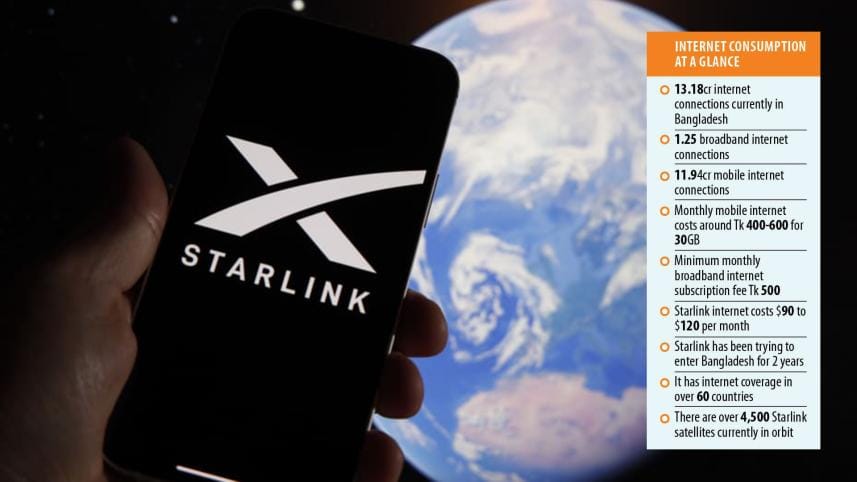Musk's Starlink to make entry to Bangladesh

The government has decided to award a licence to Starlink, operated by American aerospace company SpaceX, the brainchild of billionaire Elon Musk, in a development that could create some competition in the internet business in Bangladesh.
Starlink is a satellite internet constellation which provides broadband connections to people in over 60 countries.
"In principle, I have told the Bangladesh Telecommunication Regulatory Commission (BTRC) to provide a licence to Starlink," Zunaid Ahmed Palak, state minister for telecom and ICT, told The Daily Star yesterday.
"We want to provide equal internet services for people in cities and villages. This will ensure internet connection to remote areas, especially villages, chars and islands," he added.
The decision came at Palak's first meeting with the BTRC after he was entrusted with the responsibilities of the Posts and Telecommunications Division following Mustafa Jabbar's resignation from the post last week.
Starlink's arrival in areas with traditional telecom and cable internet will foster competition, potentially leading to improved service quality and expanded access.
As the satellite-based infrastructure enables connectivity in regions where traditional telecom and cable services struggle to reach, it can empower people in remote locations by providing them with high-speed internet, thereby unlocking educational, economic, and communication opportunities.
However, as mobile internet and broadband have already permeated almost all areas of Bangladesh, commercial success is likely to be limited.
The cost of the Starlink internet is also prohibitively high in the context of Bangladesh, costing about $120 per month in most locations while the initial hardware costs reach up to $599, according to its website.
From local ISPs, 5mbps broadband costs about Tk 500 per month while mobile internet cost between Tk 400-500 per 30GB.
Earlier, SpaceX expressed its intention to launch Starlink services in Bangladesh and its officials met with multiple government entities to this end in June this year.
Joel Meredith, manager for global government affairs at SpaceX, and Parnil Urdhwareshe, manager for global licensing and activation, made presentations on its features.
In a demonstration to the Bangladesh Satellite Company Ltd (BSCL), Starlink's internet and download speeds reached about 500mbps, according to chairman Shahjahan Mahmood.
Download speeds reached 150mbps in another demonstration to the ICT Division.
The BSCL collected five Starlink terminals (Starlink Kits) to analyse the technology and analyse how they work during rain, fog and inclement weather.
"We have seen the test results and they are good. Now they have to apply for a licence," Palak added.
One of the major hurdles to getting the licence was the government's 'lawful interception requirement', which SpaceX officials were asked to ensure.
In Bangladesh, the law permits some government agencies to access or surveil telecommunication technology to monitor criminal activities.
"We are positive. We have already given them permission for testing," BTRC Chairman Shyam Sunder Sikder said.
Asked about the lawful interception law, he said the BTRC would ensure that all conditions under the law had been met before awarding the licence.
As of October, there were 13.18 crore internet subscribers in Bangladesh, with 1.25 broadband internet connections and 11.94 crore mobile internet connections.
Md Emdadul Hoque, president of the Internet Service Provider Association of Bangladesh (ISPAB), urged the government to consult all stakeholders before taking this decision.
"Our services are now everywhere in Bangladesh, except some islands. So, why do we need satellite internet," he said.
Shahed Alam, chief corporate and regulatory officer at Robi Axiata Ltd, welcomed Starlink's entry, hoping hoped it would provide services to areas without access to fibre-based internet services.
"We also hope that the regulator would ensure principles of 'same rule for the same service', including regulations and taxation, as applicable to all wireless service providers," he added.
Fahim Mashroor, CEO of Bdjobs.com, said any new technology should be welcomed.
"But, it's very costly and very few people are likely to use it," he said.
Palak said the decision was taken to welcome new technology but added that prices had not yet been discussed.
SpaceX, currently worth about $150 billion, provides satellite internet coverage to more than 60 countries with about 4,519 Starlink satellites currently in orbit.
The company has said Starlink has more than 2 million active customers and is available on all seven continents.
On May 11, 2018, the Bangabandhu Satellite-1, Bangladesh's first and lone satellite, was launched into orbit at a cost of Tk 2,765 crore. In September this year, Bangladesh signed a letter of intent with France for its second satellite, which will be an earth observation satellite.
"The BSCL's satellite, the cost of which was borne by public funds and commercial loans, has evidently failed. But the government has to answer where it has failed, necessitating the entry of Starlink," Abu Saeed Khan, a senior policy fellow at LIRNEasia, said.



 For all latest news, follow The Daily Star's Google News channel.
For all latest news, follow The Daily Star's Google News channel.
Comments